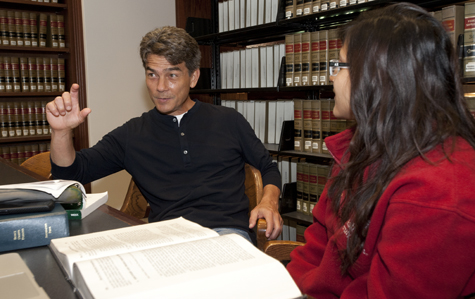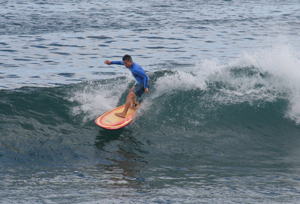
Whether surfing in his native Hawaii, promoting the rule of law in a newly independent country or navigating difficult issues in legal education and theory, Brian Z. Tamanaha approaches each adventure with thoughtful consideration.
Even at an early age, Tamanaha, JD, JSD, the William Gardiner Hammond Professor of Law at Washington University in St. Louis, was not just thinking about going to law school — something he knew he wanted to do. He was curious about understanding law and its role.
“Growing up, whenever people talked about lawyers — they were somewhat afraid of them — lawyers made people nervous,” he says. “I wanted to know why. Why is law so important in government and society? Later, I came to understand that law has a fundamental position in many different circumstances.”
As a child of schoolteachers, Tamanaha had a long-term goal of teaching law but decided to gain some experience outside of academia after graduating from law school. So he clerked for a federal judge and then became the assistant federal public defender for the District of Hawaii.
“I wanted to learn from the inside how judges make decisions,” he says. “I also thought it was important to know lawyering before I taught law.”
Tamanaha describes his time as a public defender as “two fun years in the trenches.”
“It was an amazing experience to do trials,” he says.
“It was a real challenge; you have to be very quick on your feet and strategic. I liked that there was a bit of acting involved, too.”
From the trenches to the beaches

Tamanaha spent the next seven months surfing the waves around Hawaii.
“My money was running out, and I needed to start looking for a job,” he says.
Out of the blue, Tamanaha was offered the position of assistant attorney general for Yap, part of the then-newly independent Federated States of Micronesia.
“I went to the bookstore and could not find Yap in the first atlas I opened — I was intrigued,” he says. “When I talked to my parents about it, they said ‘You’re a bum, and this sounds like a great job.’
“I was up for the adventure.”
Tamanaha was offered the job on a Wednesday. He was on a plane to Yap four days later.
He spent two years as one of two attorneys for Yap. As assistant attorney general to the Yapese attorney general, Tamanaha advised half of the government, including the Department of Education, and handled all types of cases, from criminal to civil and contracts cases.
“That was an incredible job,” Tamanaha says. “I had to do so many things for the government. Yap is a small place, but it has a government, so it had to be run.”
Academic adventures
Tamanaha took another step toward his goal of teaching law by earning a JSD at Harvard Law School.
From there, he was off on his next international stint as a faculty member at both the University of Amsterdam and the Van Vollenhoven Institute for Law and Administration in Non-Western Countries at Leiden University in the Netherlands.
“I grew up on an island in an idyllic setting, but I wanted to get out and see the world,” Tamanaha says. “The best way to get to know someplace is to live there. In the Netherlands, I was able to teach both American law and comparative law.”
Four years later, Tamanaha landed in New York City. He served in a variety of positions over 15 years at St. John’s University, including interim dean.
A faculty workshop drew him to WUSTL.
“I had been contacted by the law school’s hiring committee earlier, but I did not think I would be interested,” Tamanaha says.
“I thought I was going to stay where I was for a while, but when I came to the law school, I really liked it,” he says. “The faculty is incredible, and I loved the neighborhood. I went back to my wife and said we had to consider the offer.”
He joined the faculty in 2010.
“Brian is a spectacular scholar, teacher and citizen,” says law school Dean Kent D. Syverud, JD, the Ethan A.H. Shepley University Professor. “His work inspires careful thought, great learning and faith in the possibilities of law.”
In print
Scholarship has been an important part of Tamanaha’s career, no matter where he has been.

“I’ve written steadily since law school, even during my seven months on the beach,” he says.
He is the author of a significant number of books and articles across a range of legal topics.
Outside the United States, Tamanaha is known for his work on the rule of law, law and development, and legal pluralism, the notion that there are multiple legal systems. In the United States, he is best-known for his work debunking the notion of the formalist age.
“The standard story in the legal academy is that late 19th-century U.S. law was logically ordered and judges mechanically decided cases, and in the 1920s and ’30s, along came the realists, radicals who debunked the formal theories of law,” Tamanaha says.
“I found that this story just is not true. The late 19th-century legal scholars had very realistic views of the law, and they describe judging much the same way as the realists.
“This story was repeated in the ’20s and ’30s to delegitimize legal opponents. It became standard wisdom, but it wasn’t true.”
Tamanaha says that he also repeated this story time and again until he found evidence of his error.
“I was researching the rule of law, and I typed ‘judicial legislation 1921’ into a legal research database,” he says. “Judicial legislation (judges who create instead of interpret law) was a realist idea; however, the first documents I saw stating that judges legislate were from the late 19th century.”
One of these documents was the inaugural speech of William Gardiner Hammond, dean of the WUSTL law school and considered a major formalist legal figure.
His speech kicked off research for what would become Tamanaha’s highly praised book, Beyond the Formalist-Realist Divide: The Role of Politics in Judging.
“I guess I was destined to be the Hammond Professor,” he says.
Tamanaha diverted from his jurisprudence scholarship when he decided to examine the current state of legal education.
“My experience as dean made me dig into the issues,” he says. “I started with a series of blogs on law school tuition and the legal profession and thought that there was probably a book in all the information I was pulling together.”
A canceled flight gave Tamanaha the unexpected extra time to start his forthcoming book, Failing Law Schools.
His book takes a hard look at law schools, focusing on training, tuitions, debt and career prospects.
Tamanaha’s analysis has made him a top source for reporters at major media outlets as well as U.S. Sen. Barbara Boxer, who recently called on the American Bar Association to require law schools to provide accurate postgraduate employment and salary information about their former students.
“I definitely received an education while writing this book,” he says. “We need to make sure students are getting a return on their investment in legal education.”
Tamanaha’s dedication to scholarship can sometimes make for a difficult work-life balance.
“I enjoy working hard, but I always make sure to get back to Hawaii with my family to do some surfing,” he says.
Fast facts about Brian Z. Tamanaha
Title: William Gardiner Hammond Professor of Law
Family: Wife, Honorata, and four children ranging from a kindergartener to a freshman at WUSTL: Sava Tamanaha, Vincent Michalski, Kats Tamanaha and Jolijt Tamanaha
Notable awards: Inaugural Dennis Leslie Mahoney Prize in Legal Theory (outstanding contemporary work in sociological jurisprudence) (2006), Julius Stone Institute, for A General Jurisprudence of Law and Society; Herbert Jacob Book Prize (2002), Law and Society Association, for A General Jurisprudence of Law and Society.
Mode of transportation for his commute: A scooter